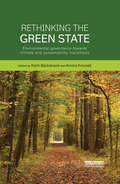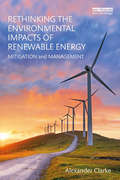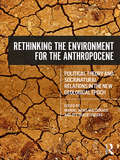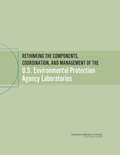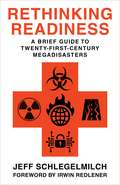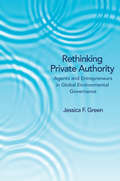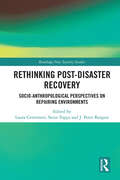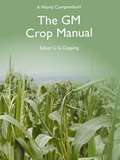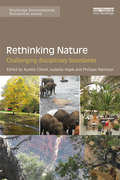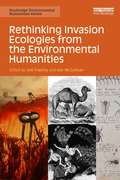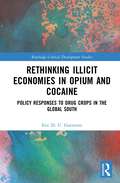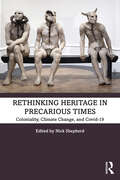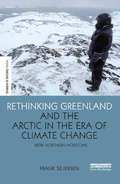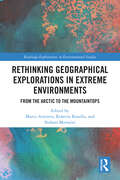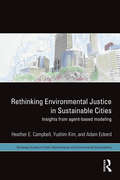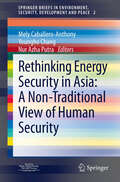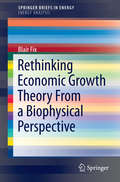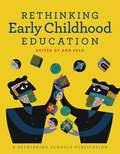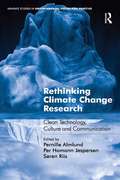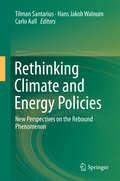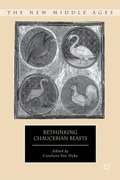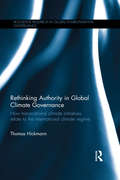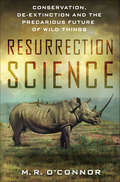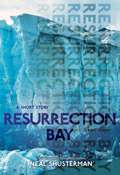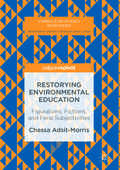- Table View
- List View
Rethinking the Green State: Environmental governance towards climate and sustainability transitions (Routledge Studies in Sustainability)
by Karin Bäckstrand Annica KronsellThis innovative book is one of the first to conduct a systematic comprehensive analysis of the ideals and practices of the evolving green state. It draws on elements of political theory, feminist theory, post-structuralism, governance and institutional theory to conceptualise the green state and advances thinking on how to understand its emergence in the context of climate and sustainability transitions. Focusing on the state as an actor in environmental, climate and sustainability politics, the book explores different principles guiding the emergence of the green state and examines the performance of states and institutional responses to the sustainable and climate transitions in the European and Nordic context in particular. The book’s unique focus on the Nordic countries underlines the important to learn from Nordics, which are perceived to be in the forefront of climate and sustainability governance as well as historically strong welfare states. With chapter contributions from leading international scholars in political science, sociology, economics, energy and environmental systems and climate policy studies, this book will be of great value to postgraduate students and researchers working on sustainability transitions, environmental politics and governance, and those with an area studies focus on the Nordic countries.
Rethinking the Environmental Impacts of Renewable Energy: Mitigation and management
by Alexander ClarkeRenewable energy is important as a substitute for finite fossil fuels and inflexible nuclear power and could conceivably power the world. However, this is challenging as the world is currently 80% dependent on fossil fuels, and renewable sources produce only about 15% of total energy. Conversion technologies for use with many of the eight different primary sources of renewable energy are only just emerging as viable technologies. While renewable energy sources will not run out, and their use involves little or no release of carbon dioxide or ionising wastes, they do have local environmental impacts of their own. This book analyses the nature of environmental impacts from renewable sources. A novel method of assessing impacts is explored based on a set of parameters centred on how diffuse or concentrated the energy flow is. The approach that is developed will inform engineers, designers, policy makers and planners as well as researchers in the area.
Rethinking the Environment for the Anthropocene: Political Theory and Socionatural Relations in the New Geological Epoch
by Manuel Arias-Maldonado Zev TrachtenbergThis book brings together the most current thinking about the Anthropocene in the field of Environmental Political Theory ('EPT'). It displays the distinctive contribution EPT makes to the task of thinking through what 'the environment' means in this time of pervasive human influence over natural systems. Across its chapters the book helps develop the idea of 'socionatural relations'—an idea that frames the environment in the Anthropocene in terms of the interconnected relationship between human beings and their surroundings. Coming from both well-established and newer voices in the field, the chapters in the book show the diversity of points of view theorists take toward the Anthropocene idea, and socionatural relations more generally. However, all the chapters exemplify a characteristic of work in EPT: the self-conscious effort to provide normative interpretations that are responsive to scientific accounts. The Introduction explains the complicated interaction between science and EPT, showing how it positions EPT to consider the Anthropocene. And the Afterword, by a pioneer in the field, relates all the chapters to a perspective that has been deeply influential in EPT. This book will be of interest to scholars already engaged in EPT. But it will also serve as an introduction to the field for students of Political Theory, Philosophy, Environmental Studies, and related disciplines, who will learn about the EPT approach from the Introduction, and then see it applied to the pressing question of the Anthropocene in the ensuing chapters. The book will also help readers interested in the Anthropocene from any disciplinary perspective develop a critical understanding of its political meanings.
Rethinking the Components, Coordination, and Management of the U.S. Environmental Protection Agency Laboratories
by Committee on Strengthening the US Environmental Protection Agency Laboratory Enterprise: Phase 1--Priority Needs Guiding Principles Overall GoalsThe Environmental Protection Agency (EPA) applies scientific results that have been provided by various parts of its own organization and by external organizations. The agency requires substantial high-quality inhouse scientific expertise and laboratory capabilities so that it can answer questions related to regulation, enforcement, and environmental effects of specific chemicals, activities, and processes. It is also usually faced with situations in which research or analytic work is time-critical, so it maintains dedicated laboratory staff and facilities that can respond quickly to such needs. In recent years, EPA has made several changes to improve the efficiency and effectiveness of its laboratories, such as the designation of national program directors to align the work of research laboratories with the needs of the agency's regulatory program offices. The agency is currently undertaking an integrated evaluation of it laboratories to enhance the management effectiveness and efficiency of its laboratory enterprise and to enhance its capabilities for research and other laboratory-based scientific and technical activities. The results of EPA's evaluation are expected to include options for colocation and consolidation of laboratory facilities. Rethinking the Components, Coordination, and Management of U. S. Environmental Protection Agency Laboratories assesses EPA's highest-priority needs for mission-relevant laboratory science and technical support, develops principles for the efficient and effective management of EPA's laboratory enterprise to meet the agency's mission needs and strategic goals, and develops guidance for enhancing efficiency and effectiveness now and during the next 10 years. EPA's laboratories play a vital role in the agency's work. The findings and recommendations of this report will help EPA to develop an implementation plan for the laboratory enterprise.
Rethinking Readiness: A Brief Guide to Twenty-First-Century Megadisasters
by Professor Jeffrey SchlegelmilchAs human society continues to develop, we have increased the risk of large-scale disasters. From health care to infrastructure to national security, systems designed to keep us safe have also heightened the potential for catastrophe. The constant pressure of climate change, geopolitical conflict, and our tendency to ignore what is hard to grasp exacerbates potential dangers. How can we prepare for and prevent the twenty-first-century disasters on the horizon?Rethinking Readiness offers an expert introduction to human-made threats and vulnerabilities, with a focus on opportunities to reimagine how we approach disaster preparedness. Jeff Schlegelmilch identifies and explores the most critical threats facing the world today, detailing the dangers of pandemics, climate change, infrastructure collapse, cyberattacks, and nuclear conflict. Drawing on the latest research from leading experts, he provides an accessible overview of the causes and potential effects of these looming megadisasters. The book highlights the potential for building resilient, adaptable, and sustainable systems so that we can be better prepared to respond to and recover from future crises. Thoroughly grounded in scientific and policy expertise, Rethinking Readiness is an essential guide to this century’s biggest challenges in disaster management.
Rethinking Private Authority: Agents and Entrepreneurs in Global Environmental Governance
by Jessica F. GreenRethinking Private Authority examines the role of non-state actors in global environmental politics, arguing that a fuller understanding of their role requires a new way of conceptualizing private authority. Jessica Green identifies two distinct forms of private authority--one in which states delegate authority to private actors, and another in which entrepreneurial actors generate their own rules, persuading others to adopt them. Drawing on a wealth of empirical evidence spanning a century of environmental rule making, Green shows how the delegation of authority to private actors has played a small but consistent role in multilateral environmental agreements over the past fifty years, largely in the area of treaty implementation. This contrasts with entrepreneurial authority, where most private environmental rules have been created in the past two decades. Green traces how this dynamic and fast-growing form of private authority is becoming increasingly common in areas ranging from organic food to green building practices to sustainable tourism. She persuasively argues that the configuration of state preferences and the existing institutional landscape are paramount to explaining why private authority emerges and assumes the form that it does. In-depth cases on climate change provide evidence for her arguments. Groundbreaking in scope, Rethinking Private Authority demonstrates that authority in world politics is diffused across multiple levels and diverse actors, and it offers a more complete picture of how private actors are helping to shape our response to today's most pressing environmental problems.
Rethinking Post-Disaster Recovery: Socio-Anthropological Perspectives on Repairing Environments (Routledge New Security Studies)
by Laura Centemeri Sezin Topçu J. Peter BurgessThis book presents an original interdisciplinary approach to the study of the so-called ‘recovery phase’ in disaster management, centered on the notion of repairing. The volume advances thinking on disaster recovery that goes beyond institutional and managerial challenges, descriptions, and analyses. It encourages socially, politically, and ethically engaged questioning of what it means to recover after disaster. At the center of this analysis, contributions examine the diversity of processes of repairing through which recovery can take place, and the varied meanings actors attribute to repair at different times and scales of such processes. It also analyses the multiple arenas (juridical, expert, political) in which actors are engaged in struggles of sense-making over the "what-ness" of a disaster and the paths for recovery. These struggles are interlinked with interest-based and power-based ones which maintain structural conditions of inequality and exploitation, pre-existing social hierarchies and established forms of marginality. The work uses case studies from all over the world, cutting-edge theoretical discussions, and original empirical research to put critical and interpretative approaches in social sciences into dialogue, opening the venue for innovative approaches in the study of environmental disasters. This book will be of much interest to students of disaster management, sociology, anthropology, law and philosophy.
Rethinking Park Protection
by Will LapageIn today's society, hidden beliefs can subtly guide the management of parks, such as treating them as natural resources rather than national assets. Resulting management practices often lead to deferred maintenance on park infrastructure, causing inadequate protection from vandalism, poaching, and theft of artefacts. A sad demise, often due to an out-dated belief that parks are non-essential leisure services rather than necessities for a vibrant modern life. This book challenges the reader to examine the core beliefs that created our public parklands, comparing them with the beliefs that guide contemporary park stewardship in an effort to improve the management of parks and reassess their purpose in modern life.
Rethinking Nature: Challenging Disciplinary Boundaries (Routledge Environmental Humanities)
by Aurélie Choné Isabelle Hajek Philippe HammanContemporary ideas of nature were largely shaped by schools of thought from Western cultural history and philosophy until the present-day concerns with environmental change and biodiversity conservation. There are many different ways of conceptualising nature in epistemological terms, reflecting the tensions between the polarities of humans as masters or protectors of nature and as part of or outside of nature. The book shows how nature is today the focus of numerous debates, calling for an approach which goes beyond the merely technical or scientific. It adopts a threefold – critical, historical and cross-disciplinary – approach in order to summarise the current state of knowledge. It includes contributions informed by the humanities (especially history, literature and philosophy) and social sciences, concerned with the production and circulation of knowledge about "nature" across disciplines and across national and cultural spaces. The volume also demonstrates the ongoing reconfiguration of subject disciplines, as seen in the recent emergence of new interdisciplinary approaches and the popularity of the prefix "eco-" (e.g. ecocriticism, ecospirituality, ecosophy and ecofeminism, as well as subdivisions of ecology, including urban ecology, industrial ecology and ecosystem services). Each chapter provides a concise overview of its topic which will serve as a helpful introduction to students and a source of easy reference.? This text is also valuable reading for researchers interested in philosophy, sociology, anthropology, geography, ecology, politics and all their respective environmentalist strands.
Rethinking Invasion Ecologies from the Environmental Humanities: Rethinking Invasion Ecologies From The Environmental Humanities (Routledge Environmental Humanities)
by Iain McCalman Jodi FrawleyResearch from a humanist perspective has much to offer in interrogating the social and cultural ramifications of invasion ecologies. The impossibility of securing national boundaries against accidental transfer and the unpredictable climatic changes of our time have introduced new dimensions and hazards to this old issue. Written by a team of international scholars, this book allows us to rethink the impact on national, regional or local ecologies of the deliberate or accidental introduction of foreign species, plant and animal. Modern environmental approaches that treat nature with naïve realism or mobilize it as a moral absolute, unaware or unwilling to accept that it is informed by specific cultural and temporal values, are doomed to fail. Instead, this book shows that we need to understand the complex interactions of ecologies and societies in the past, present and future over the Anthropocene, in order to address problems of the global environmental crisis. It demonstrates how humanistic methods and disciplines can be used to bring fresh clarity and perspective on this long vexed aspect of environmental thought and practice. <P><P>Students and researchers in environmental studies, invasion ecology, conservation biology, environmental ethics, environmental history and environmental policy will welcome this major contribution to environmental humanities.
Rethinking Illicit Economies in Opium and Cocaine: Policy Responses to Drug Crops in the Global South (Routledge Critical Development Studies)
by Eric D. GutierrezThis book investigates the cross-border trade in illicit drug crops in the global south. It exposes an important paradox: despite all the dangers and negative consequences of these criminal networks, in many cases, they also provide marginalised and excluded communities with important private sources of protection, investment, and employment. This book reconstructs and compares socioeconomic contexts, criminal careers, and changes in farmgate prices of illicit coca and opium poppy crops in Afghanistan, Myanmar, Colombia, and Bolivia. It investigates the politics of strange bedfellows; informal bankers-without-suits providing cross-border financial services to the undocumented and the unbanked; the criminals without borders; and the mystery of illicit crop prices. The book challenges commonly held assumptions and casts new light on how relationships of conflict and accommodation are arranged and re-arranged in fluid, ever-changing contexts, producing often paradoxical outcomes. It then suggests policy reforms and alternative approaches to drug policy, development aid, and peacebuilding work. Researchers and students across development, peacebuilding, illicit economies, and conflict studies will find this book an important source of original research and analysis. It will also be useful for politicians, commentators and public officials considering what to do differently in tackling illicit drug economies.
Rethinking Heritage in Precarious Times: Coloniality, Climate Change, and Covid-19
by Nick ShepherdRethinking Heritage in Precarious Times sets a fresh agenda for Heritage Studies by reflecting upon the unprecedented nature of the contemporary moment. In doing so, the volume also calls into question established ideas, ways of working, and understandings of the future. Presenting contributions by leading figures in the field of Heritage Studies, Indigenous scholars, and scholars from across the global north and global south, the volume engages with the most pressing issues of today: coloniality, the climate emergency, the Covid-19 pandemic, structural racism, growing social and economic inequality, and the ongoing struggle for dignity and restitution.Considering the impact of climate change, chapters re-imagine museums for climate action, explore the notion of a world heritage for the Anthropocene, and reflect on heritage and posthumanism. Drawing inspiration from the global demonstrations against racism, police violence and authoritarianism, chapters explore the notion of a people’s heritage, draw on local and Indigenous conceptualizations to lay out a notion of heritage in the service of social justice and restitution, and detail the precariousness of universities and heritage institutions in the global south. Analysing the ongoing impact of the Covid-19 pandemic, chapters also explore the changing nature of life under lockdown, describe its effects on theories of urbanity, and reflect on emergent Covidsocialities and heritage-in-the-making. Rethinking Heritage in Precarious Times argues that we need the deep-time perspective that Heritage Studies offers, as well as its sense of transgenerational conversations andaccountabilities, in order to respond to these many challenges—and to craft open,creative, and inclusive futures. It will be essential reading for academics and studentsengaged in the study of heritage, anthropology, memory, history, and geography.
Rethinking Greenland and the Arctic in the Era of Climate Change: New Northern Horizons (The Earthscan Science in Society Series)
by Frank SejersenThis ground-breaking book investigates how Arctic indigenous communities deal with the challenges of climate change and how they strive to develop self-determination. Adopting an anthropological focus on Greenland’s vision to boost extractive industries and transform society, the book examines how indigenous communities engage with climate change and development discourses. It applies a critical and comparative approach, integrating both local perspectives and adaptation research from Canada and Greenland to make the case for recasting the way the Arctic and Inuit are approached conceptually and politically. The emphasis on indigenous peoples as future-makers and right-holders paves the way for a new understanding of the concept of indigenous knowledge and a more sensitive appreciation of predicaments and dynamics in the Arctic. This book will be of interest to post-graduate students and researchers in environmental studies, development studies and area studies.
Rethinking Geographical Explorations in Extreme Environments: From the Arctic to the Mountaintops (Routledge Explorations in Environmental Studies)
by Marco Armiero Roberta Biasillo Stefano MorosiniFocusing on extreme environments, from Umberto Nobile’s expedition to the Arctic to the commercialization of Mt Everest, this volume examines global environmental margins, how they are conceived and how perceptions have changed. Mountaintops and Arctic environments are the settings of social encounters, political strategies, individual enterprises, geopolitical tensions, decolonial practises, and scientific experiments. Concentrating on mountaineering and Arctic exploration between 1880 – 1960, contributors to this volume show how environmental marginalisation has been discursively implemented and materially generated by foreign and local actors. It examines to what extent the status and identity of extreme environments has changed during modern times, moving them from periphery to the centre and discarding their marginality. The first section looks at ways in which societies have framed remoteness, through the lens of commercialization, colonialism, knowledge production and sport, while the second examines the reverse transfer, focusing on how extreme nature has influenced societies, through international network creation, political consensus and identity building. This collection enriches the historical understanding of exploration by adopting a critical approach and offering multidimensional and multi-gaze reconstructions. This book is essential reading for students and scholars interested in environmental history, geography, colonial studies and the environmental humanities.
Rethinking Environmental Justice in Sustainable Cities: Insights from Agent-Based Modeling (Routledge Studies in Public Administration and Environmental Sustainability)
by Heather E. Campbell Yushim Kim Adam M. EckerdAs the study of environmental policy and justice becomes increasingly significant in today’s global climate, standard statistical approaches to gathering data have become less helpful at generating new insights and possibilities. None of the conventional frameworks easily allow for the empirical modeling of the interactions of all the actors involved, or for the emergence of outcomes unintended by the actors. The existing frameworks account for the "what," but not for the "why." Heather E. Campbell, Yushim Kim, and Adam Eckerd bring an innovative perspective to environmental justice research. Their approach adjusts the narrower questions often asked in the study of environmental justice, expanding to broader investigations of how and why environmental inequities occur. Using agent-based modeling (ABM), they study the interactions and interdependencies among different agents such as firms, residents, and government institutions. Through simulation, the authors test underlying assumptions in environmental justice and discover ways to modify existing theories to better explain why environmental injustice occurs. Furthermore, they use ABM to generate empirically testable hypotheses, which they employ to check if their simulated findings are supported in the real world using real data. The pioneering research on environmental justice in this text will have effects on the field of environmental policy as a whole. For social science and policy researchers, this book explores how to employ new and experimental methods of inquiry on challenging social problems, and for the field of environmental justice, the authors demonstrate how ABM helps illuminate the complex social and policy interactions that lead to both environmental justice and injustice.
Rethinking Energy Security in Asia: A Non-Traditional View of Human Security
by Mely Caballero-Anthony Youngho Chang Nur Azha PutraTraditional notions of security are premised on the primacy of state security. In relation to energy security, traditional policy thinking has focused on ensuring supply without much emphasis on socioeconomic and environmental impacts. Non-traditional security (NTS) scholars argue that threats to human security have become increasingly prominent since the end of the Cold War, and that it is thus critical to adopt a holistic and multidisciplinary approach in addressing rising energy needs. This volume represents the perspectives of scholars from across Asia, looking at diverse aspects of energy security through a non-traditional security lens. The issues covered include environmental and socioeconomic impacts, the role of the market, the role of civil society, energy sustainability and policy trends in the ASEAN region.
Rethinking Economic Growth Theory From a Biophysical Perspective
by Blair FixNeoclassical growth theory is the dominant perspective for explaining economic growth. At its core are four implicit assumptions: 1) economic output can become decoupled from energy consumption; 2) economic distribution is unrelated to growth; 3) large institutions are not important for growth; and 4) labor force structure is not important for growth. Drawing on a wide range of data from the economic history of the United States, this book tests the validity of these assumptions and finds no empirical support. Instead, connections are found between the growth in energy consumption and such disparate phenomena as economic redistribution, corporate employment concentration, and changing labor force structure. The integration of energy into an economic growth model has the potential to offer insight into the future effects of fossil fuel depletion on key macroeconomic indicators, which is already manifested in stalled or diminished growth and escalating debt in many national economies. This book argues for an alternative, biophysical perspective to the study of growth, and presents a set of "stylized facts" that such an approach must successfully explain. Aspects of biophysical analysis are combined with differential monetary analysis to arrive at a unique empirical methodology for investigating the elements and dependencies of the economic growth process.
Rethinking Early Childhood Education
by Ann PeloIt shows how educators can nurture empathy, ecological consciousness, curiosity, collaboration, and activism in young children. It invites readers to rethink early childhood education, reminding them that it is inseparable from social justice and ecological education. An outstanding resource for childcare providers, early-grade teachers, and teacher education and staff development programs.
Rethinking Climate Change Research: Clean Technology, Culture and Communication (Routledge Studies in Environmental Policy and Practice)
by Pernille AlmlundThe problems and debates surrounding climate change possess closely intertwined social and scientific aspects. This book highlights the importance of researching climate change through a multi-disciplinary approach; namely through cultural studies, communication studies, and clean-technology studies. These three dimensions taken together have the ability to constitute a positive agenda for climate change science in its broader understanding. To cope with the climate change challenge, not only do we need new energy efficient technologies, other ways of living, and new ways to communicate but we especially need new ways to start thinking about climate change across disciplines and backgrounds. We need to begin thinking across engineering, cultural science and communication in order to create innovative solutions, as well as to generate optimistic and progressive narratives about the future. Accentuating these 'softer' scientific disciplines, their overlaps, and the positive discourses they can create, this book provides some more profoundly researched themes pertaining to climate change and by that, strengthening the analytical as well as the integrative approaches toward the fundamental questions at stake.
Rethinking Climate and Energy Policies
by Tilman Santarius Hans Jakob Walnum Carlo AallThis book calls for rethinking current climate, energy and sustainability policy-making by presenting new insights into the rebound phenomenon; i. e. , the driving forces, mechanisms and extent of rebound effects and potential means of mitigating them. It pursues an innovative and novel approach to the political and scientific rebound discourse and hence, supplements the current state-of-knowledge discussed in the field of energy economics and recent reports by the Intergovernmental Panel on Climate Change. Building on central rebound publications from the past four decades, this book is divided into three main sections: Part I highlights new aspects of rebound economics by presenting insights into issues that have so far not been satisfactorily researched, such as rebounds in countries of the Global South, rebounds on the producer-side, and rebounds from sufficiency behaviour (as opposed to rebounds from technical efficiency improvements). In turn, Part II goes beyond conventional economic rebound research, exploring multidisciplinary perspectives on the phenomenon, in particular from the fields of psychology and sociology. Advancing such multidisciplinary perspectives delivers a more comprehensive understanding of rebound's driving forces, mechanisms, and policy options. Part III puts rebounds into practice and presents several policy cases and sector-specific approaches, including the contexts of labour markets, urban planning, tourism, information and communication technologies, and transport. Lastly, the book embeds the issue into the larger debate on decoupling, green growth and degrowth, and identifies key lessons learned for sustainable development strategies and policies at large. By employing such varied and in-depth analyses, the book makes an essential contribution to the discussion of the overall question: Can resource-, energy-use and greenhouse gas emissions be substantially reduced without hindering economic growth?
Rethinking Chaucerian Beasts
by Carolynn Van DykeBuilding on recent work in critical animal studies and posthumanism, this book challenges past assumptions that animals were only explored as illustrative of humanity, not as interesting in their own right. The contributors combine close reading of Chaucer's texts with insights drawn from cultural or critical animal studies.
Rethinking Authority in Global Climate Governance: How transnational climate initiatives relate to the international climate regime (Routledge Research in Global Environmental Governance)
by Thomas HickmannIn the past few years, numerous authors have highlighted the emergence of transnational climate initiatives, such as city networks, private certification schemes, and business self-regulation in the policy domain of climate change. While these transnational governance arrangements can surely contribute to solving the problem of climate change, their development by different types of sub- and non-state actors does not imply a weakening of the intergovernmental level. On the contrary, many transnational climate initiatives use the international climate regime as a point of reference and have adopted various rules and procedures from international agreements. Rethinking Authority in Global Climate Governance puts forward this argument and expands upon it, using case studies which suggest that the effective operation of transnational climate initiatives strongly relies on the existence of an international regulatory framework created by nation-states. Thus, this book emphasizes the centrality of the intergovernmental process clustered around the United Nations Framework Convention on Climate Change (UNFCCC) and underscores that multilateral treaty-making continues to be more important than many scholars and policy-makers suppose. This book will be of great interest to students and scholars of global environmental politics, climate change and sustainable development.
Resurrection Science: Conservation, De-Extinction and the Precarious Future of Wild Things
by M. R. O'Connor**A Library Journal Best Book of 2015 ****A Christian Science Monitor Top Ten Book of September**In a world dominated by people and rapid climate change, species large and small are increasingly vulnerable to extinction. In Resurrection Science, journalist M. R. O'Connor explores the extreme measures scientists are taking to try and save them, from captive breeding and genetic management to de-extinction. Paradoxically, the more we intervene to save species, the less wild they often become. In stories of sixteenth-century galleon excavations, panther-tracking in Florida swamps, ancient African rainforests, Neanderthal tool-making, and cryogenic DNA banks, O'Connor investigates the philosophical questions of an age in which we "play god" with earth's biodiversity. Each chapter in this beautifully written book focuses on a unique species--from the charismatic northern white rhinoceros to the infamous passenger pigeon--and the people entwined in the animals' fates. Incorporating natural history and evolutionary biology with conversations with eminent ethicists, O'Connor's narrative goes to the heart of the human enterprise: What should we preserve of wilderness as we hurtle toward a future in which technology is present in nearly every aspect of our lives? How can we co-exist with species when our existence and their survival appear to be pitted against one another?
Resurrection Bay
by Neal ShustermanFrom New York Times bestselling author Neal Shusterman comes a thrilling, spine-tingling 32-page original short story that's perfect for fans of Unwind and UnWholly. Bones. They know the call of the ice. Anika knows the call of the ice, too. Living in an isolated port town in Alaska with her father and younger brother, Anika is practically steps away from the Harding Icefield, and Exit Glacier has always been her favorite place. But after a couple tragically dies there, Exit Glacier seems to come alive and begins moving toward the town with unnatural speed. Anika feels deep in her bones that the ice wants something. . . . After the glacier finally stops in the town's cemetery, Anika and her on-again, off-again boyfriend, Rav, face a sinister truth: The soul of the glacier is looking for bodies to inhabit . . . and where better to find them than the graveyard? This fast-paced, eerie short story is a deft blend of suspense and horror that will leave readers breathless . . . and chilled to the bone. HarperTeen Impulse is a digital imprint focused on young adult short stories and novellas, with new releases the first Tuesday of each month.
Restorying Environmental Education
by Chessa Adsit-MorrisThis book examines a performative environmental educational inquiry through a place-based eco-art project collaboratively undertaken with a class of grade 4-6 students around the lost streams of Vancouver. The resulting work explores the contradictions gathered in relation to the Western educational system and the encounter with "Other" (real and imaginary others), including the shifting and growing "self," and an attempt to find and foster nourishing alliances for transforming environmental education. Drawing on the work of new materialist theorists Donna Haraway, Rosi Braidotti, and Karen Barad, Adsit-Morris considers the co-constitutive materiality of human corporeality and nonhuman natures and provides useful tools for finding creative theoretical alternatives to the reductionist, representationalist, and dualistic practices of the Western metaphysics.
